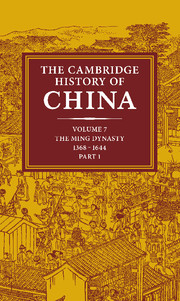Book contents
- Frontmatter
- Introduction
- 1 The rise of the Ming dynasty, 1330–1367
- 2 Military Origins of Ming China
- 3 The Hung-wu reign, 1368–1398
- 4 The Chien-wen, Yung-lo, Hung-hsi, and Hsüan-te reigns, 1399–1435
- 5 The Cheng-t'ung, Ching-t'ai, and T'len-shun reigns, 1436–1464
- 6 The Ch'eng-hua and Hung-chih reigns, 1465–1505
- 7 The Cheng-te reign, 1506–1521
- 8 The Chia-ching reign, 1522–1566
- 9 The Lung-ch'ing and Wan-li reigns, 1567–1620
- 10 The T'ai-ch'ang, T'ien-ch'i, and Ch'ung-chen reigns, 1620–1644
- 11 The Southern Ming, 1644–1662
- 12 Historical writing during the Ming
- Bibliographic notes
- Bibliography
- Glossary-index
- References
2 - Military Origins of Ming China
Published online by Cambridge University Press: 28 March 2008
- Frontmatter
- Introduction
- 1 The rise of the Ming dynasty, 1330–1367
- 2 Military Origins of Ming China
- 3 The Hung-wu reign, 1368–1398
- 4 The Chien-wen, Yung-lo, Hung-hsi, and Hsüan-te reigns, 1399–1435
- 5 The Cheng-t'ung, Ching-t'ai, and T'len-shun reigns, 1436–1464
- 6 The Ch'eng-hua and Hung-chih reigns, 1465–1505
- 7 The Cheng-te reign, 1506–1521
- 8 The Chia-ching reign, 1522–1566
- 9 The Lung-ch'ing and Wan-li reigns, 1567–1620
- 10 The T'ai-ch'ang, T'ien-ch'i, and Ch'ung-chen reigns, 1620–1644
- 11 The Southern Ming, 1644–1662
- 12 Historical writing during the Ming
- Bibliographic notes
- Bibliography
- Glossary-index
- References
Summary
INTRODUCTION
The founding of the Ming dynasty was the end product of the anti-Yüan peasant rebellions of the 1350s. The rebellions themselves were the final stage of a long history of Chinese resentment against Mongol rule, expressed at the elite level by reluctance to serve in the government and at the popular level by clandestine sectarian activity. The occasion for the rebellions was the failure of the Yüan regime to cope with widespread famine in the 1340s. By the time those occurred, paradoxically the Yüan ruling elite had largely come to an accommodation with the native Chinese political tradition.
The rebellions inaugurated a period of political flux whose ultimate outcome might have been a divided China rather than a reunified state. The original rebel movement destroyed the foundations of Yüan authority without being able to erect a stable successor regime. The improvised militia armies which then destroyed the main body of the original rebel movement in the North China plain and in the central Yangtze, together with the principal rebel survivors of this destruction, mostly became the nuclei of regional warlord regimes after 1353. Chu Yuan-chang, the future Ming founder, gained a decisive victory in 1363; he exploited his victory by conquering and consolidating his control over the middle and lower Yangtze regions, a process completed by the capture of Soochow in 1367. Afterward Ming military expeditions rapidly conquered the rest of China proper. Szechwan was annexed in 1371.
- Type
- Chapter
- Information
- The Cambridge History of China , pp. 58 - 106Publisher: Cambridge University PressPrint publication year: 1988
References
- 3
- Cited by



